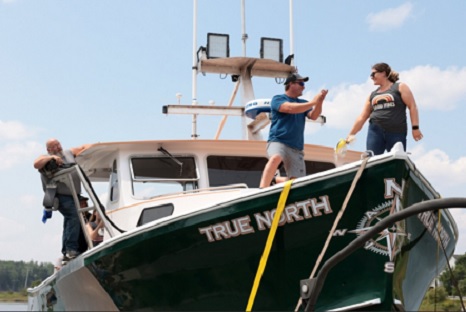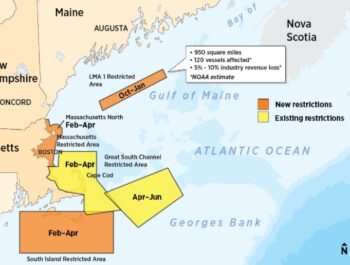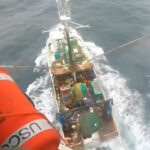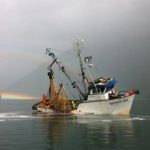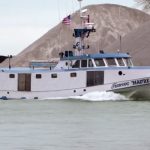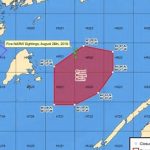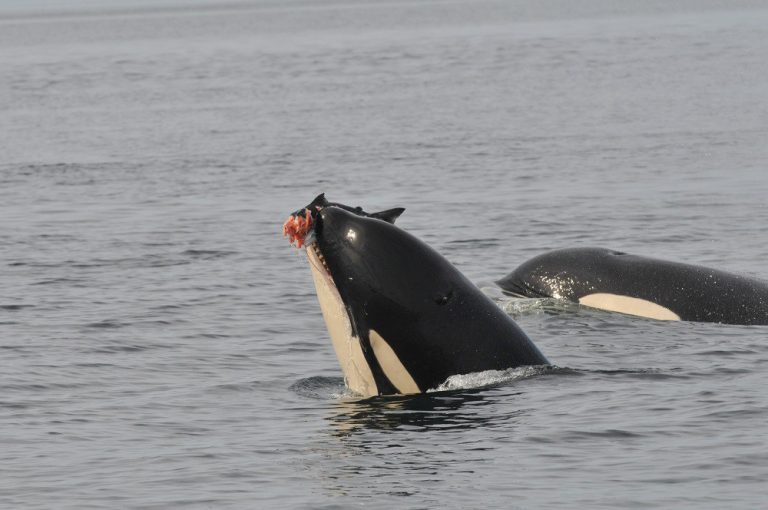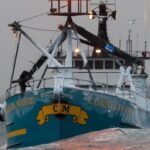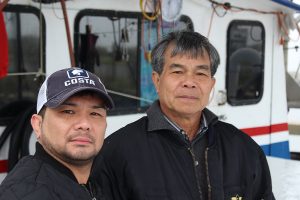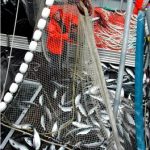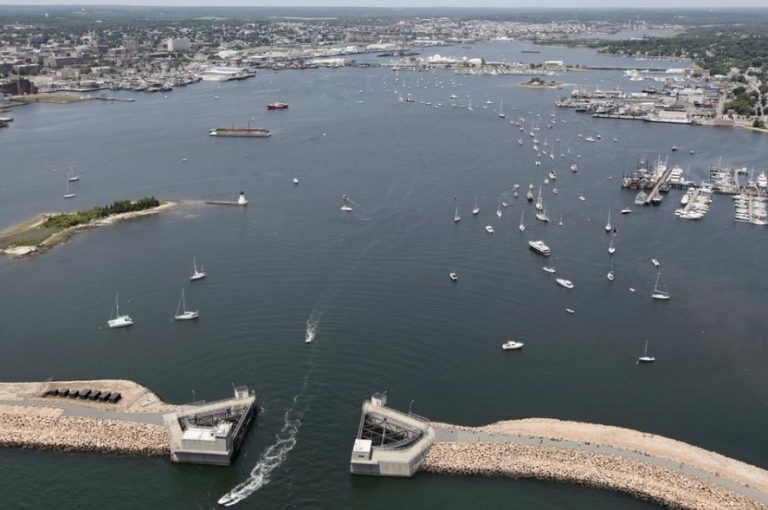Tag Archives: North Atlantic right whale
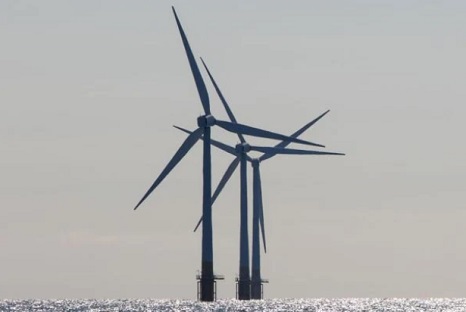
Martha’s Vineyard lobstermen oppose NOAA “incidental take” decision
Lobstermen Wayne Iacono and Wes Brighton expressed frustration at the “double-standard” that NOAA seems to be playing by giving Vineyard Wind an incidental “take” count. The Marine Mammals Protection Act defines take as “to harass, hunt, capture, or kill, or attempt to harass, hunt, capture, or kill any marine mammal.” Vineyard Wind is allowed some incidental take, which is “unintentional, but not unexpected, taking,” according to NOAA. One species, in particular, the lobstermen are worried about is the endangered North Atlantic Right Whale. >click to read< 15:41

North Atlantic Right Whale: Extinction Is Looming. Everyone’s Fighting.
This May, new rules created for the lobster industry by the National Marine Fisheries Service will become official policy for boats operating in right whale territory. The agency estimates that lobster and Jonah crab traps are responsible for 95 percent of vertical end-line ropes in the areas where whale protections apply and therefore pose the most risk for entangling whales. The Fisheries Service says these changes will reduce the risk of death and serious injury by 69 percent. But in the months after the rules were finalized, the agency has seen pushback from conservation groups, who argue the new protections aren’t enough, and lobster fishing crews, who say the rules will harm their business. >click to read< 14:22

New Jersey residents sue over offshore wind farm leases
A group of New Jersey residents have sued the Bureau of Ocean Energy Management to seek the reversal of its March decision to pursue the development of an area of ocean 30 miles off the coast of New Jersey for wind turbines. Community group Save Long Beach Island accused BOEM in Washington, D.C., federal court Monday of failing to prepare an in-depth report on potential environmental impacts of selecting 800,000 acres of the New York Bight to lease to developers that would install wind turbines. The group also says that the development could further imperil the North Atlantic right whale, one of the world’s most endangered large whale species. >click to read< 19:35
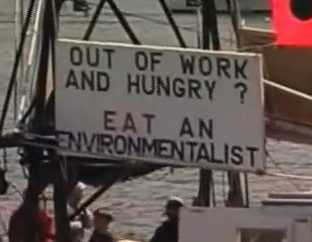
Lawsuit filed to Protect Pacific Humpback from fishing gear, Can lawsuits save North Atlantic Right Whale?
The Center for Biological Diversity sued the National Marine Fisheries Service today for failing to protect endangered Pacific humpback whales from deadly entanglements in sablefish pot gear off the coasts of California, Oregon and Washington. According to Fisheries Service estimates, the sablefish fishery on average kills or seriously injures about two humpback whales every year. The fishery uses 2-mile-long strings of 30 to 50 pots. >click to read< Can Litigation Help Save the North Atlantic Right Whale From Extinction? – As conservation organizations and governments around the globe grapple with the devastating effects of climate change and overexploitation, the legal battle fought over the critically endangered North Atlantic right whale, one of the world’s most endangered large whale species, may provide insights into how litigation can help, or hinder, efforts to save species from extinction. >click to read< 13:41
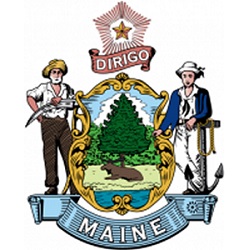
Maine Granted Intervenor Status in Lawsuit Challenging Federal Regulations
Governor Janet Mills announced today that the Maine Department of Marine Resources (DMR) has been granted intervenor status in Maine Lobstermen’s Association v National Marine Fisheries Service, a lawsuit before the U.S. District Court in Washington, D.C. that challenges Federal regulations hurting Maine’s vital lobster industry. It is the Mills Administration’s latest effort to stand up for the lobster industry and its hard working men and women in the face of the Federal government’s burdensome proposal. >click to read< 09:26
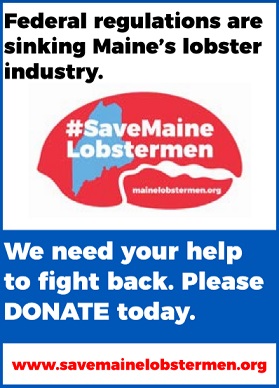
Lobster fishing being threatened
Commercial fishing, in particular, lobster fishing is an integral part of our local community and the economy of our state. This way of life is being threatened by new burdensome federal regulations. Over time, this will drive many fishermen out of business and forever change the character of the Maine lobster industry and our community. These regulations are championed as a way to help protect the North Atlantic right whale but will fail to do so. We have to fight back against this regulatory onslaught. >click to read< by Troy Plummer and Mark Jones, and please click and donate to www.savemainelobstermen.org, if you can!

Massachusetts Lobstermen’s Association files motion to join lawsuit
The Massachusetts Lobstermen’s Association filed a motion to join the Maine Lobstermen’s Association’s lawsuit, challenging the National Oceanic and Atmospheric Administration’s 10-year right whale protection plan. The plan requires lobstermen to make significant changes to prevent whales from getting tangled in their gear. The group filed the motion in Washington D.C. District Court, looking to join the lawsuit as a third party. >click to read< 16:50

Maine: Whale rules, pending lawsuits focus of gloomy Lobster Advisory Council meeting
A complicated and potentially grim future is predicted for the commercial lobster industry, with environmental groups, gear changes, the closure of offshore waters to lobster fishing and judicial rulings painting a “doom and gloom” picture, in the words of Department of Marine Resources Commissioner Patrick Keliher. “I think there’s going to be a lot of moving pieces,” Some of those pieces could spell the end of the commercial lobster fishery in Maine, DMR Deputy Commissioner Meredith Mendelson said, as she ran through the current lawsuits aimed at preserving the North Atlantic right whale. If any or all prevail, the lobster fishery will bear the brunt of the results. >click to read< 08:12
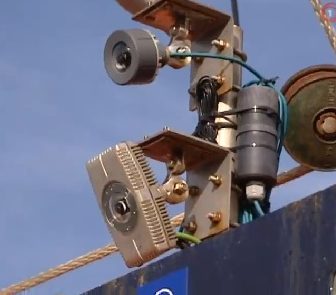
Electronic Monitoring: Hearings set for new electronic lobster boat tracking rules
An arm of the Atlantic States Marine Fisheries Commission is considering implementing the tracking requirements for lobster and Jonah crab boats that have federal permits. A Jan. 19 hearing will be held via webinar and in person at the Urban Forestry Center in Portsmouth, New Hampshire. The other hearings will be held virtually. Others are slated for mid-Atlantic states, Maine and Massachusetts and Rhode Island. >click to read< 16:15
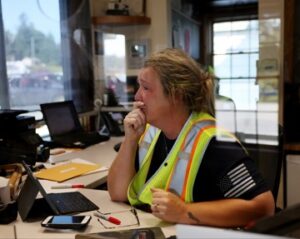
The ‘Lobster Trap’, Part II – Protests and Prayers
When she heard the news, in the middle of her shift selling tickets at the ferry terminal, Cathy Watt broke down in tears. The U.S. government had just ordered the unprecedented closure of a 1,000 square-mile swath of ocean off Maine’s coast to traditional lobster fishing for four months a year, starting in October. It was a crushing consequence of climate change: Warming oceans have hastened an endangered whale’s journey to the brink of extinction, and now Maine fishermen would pay the price. photos, video, part II of a series, >click to read< 09:49 ‘The Lobster Trap’ >click to read<
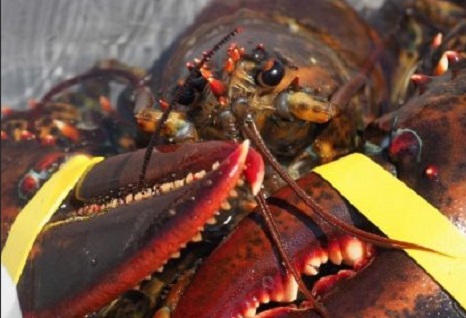
Maine’s lobster industry is in a fight for its survival
In October, a U.S. District Court judge in Bangor had ruled that there was reason to question the federal government’s decision to close this prime lobstering area for four months this winter. When an appeals court overturned this decision in November, lobstermen who had already set traps in this area were forced to dangerously hurry and take them up, creating economic hardship for those who invested in gear, rigged up and were already fishing in these productive waters. For Maine’s lobster industry, this is another frustrating example of one step forward, two steps back. This latest court ruling, however, is just the tip of the iceberg that threatens to sink the fishery. >click to read< 09:57

Supreme Court denies lobstermen’s bid to halt Gulf of Maine fishing restrictions
The Supreme Court on Friday denied a request by lobster fishers to halt environmental protections that restrict fishing in a large swath of the Gulf of Maine. The application, filed earlier this week by a lobster fishers’ union and two lobster fishing companies, was rejected without comment by Justice Stephen Breyer, who handles emergency matters arising from the region. >click to read< 13:13

Lobstermen ask Supreme Court to halt restrictions meant to protect whales
The protections in question restrict the use of lobster traps in nearly 1,000 square miles in the Gulf of Maine between October and January. They are intended to protect the North Atlantic right whale,,, In the emergency application, the union and fishing companies said the restrictions would curtail fishing by more than 100 of the state’s “largest and most productive” boats, many of which only fish in the restricted area. “These fishermen and their communities have no other means to make a living except by fishing in these waters during this specific time of year, and even the loss of one season will see their vessels repossessed and their gear obsolete due to changing regulations with no funds to update them,” the application states. >click to read< 13:16 Lobstering union petitions U.S. Supreme Court to overturn Gulf of Maine closure – The Maine Lobstering Union has filed a petition asking to plead its case before the U.S. Supreme Court in an effort to reopen the area, which is slated to be closed through January – and every subsequent October through January – in an effort to protect the critically endangered North Atlantic right whale. >click to read< 17:20
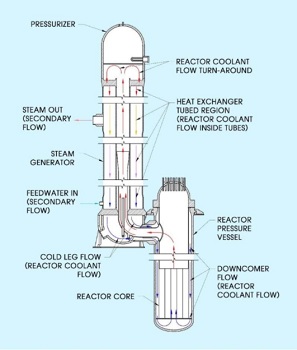
Right whale coalition calls for moratorium of offshore wind farm turbines
A local citizens group has announced the creation of the Save Right Whales Coalition, which is determined to stop offshore wind turbine projects that members say could harm whales. “Any species whose numbers are this low requires that we not take any additional action that could harm these whales,” political and environmental author and activist Michael Shellenberger said of the endangered North Atlantic right whales. “Particularly given that we have an abundance of nuclear and natural gas resources that would provide a sufficient alternative to these large industrial wind turbines.” >click to read< 13:49

Judge rejects efforts by feds, enviro’s to impose immediate restrictions on lobstering
Last month, Justice Lance Walker sided with the Maine Lobstering Union and granted a temporary injunction to stop a new federal closure of a roughly 960-square mile area off the Maine coast. The federal agencies appealed that decision and asked for an emergency “stay” of the order, contending the closure is essential now to protect endangered right whales. On Friday, Justice Walker denied that request, meaning the area remains open to fishing. >click to read< 16:10

Feds, con groups file appeal to reinstate seasonal lobstering ban
In their appeal, the federal government and the conservation groups, the Center for Biological Diversity, the Conservation Law Foundation and the Defenders of Wildlife, argue that not only did the National Marine Fisheries Service use the best available science, but also that the lobstering groups did not present any actual evidence of the “certain economic harms” the judge referenced. Also in the appeal, the groups claim that the plaintiffs’ criticism of the availability and quality of data to support the restrictions is misplaced. The fisheries service admitted that more data would be beneficial to refine the agency’s understanding of right whale distribution, but it argued that the data already available is sufficient. >click to read< 08:02
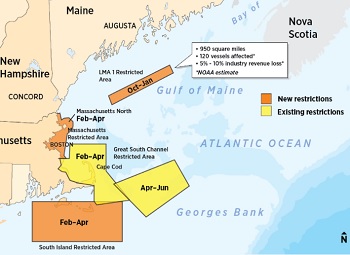
Gulf of Maine: Whale scientists fire back – Marine biologists disagree with a judge’s decision
Lobster industry professionals, elected officials and now a federal judge have expressed doubts as to whether the National Marine Fisheries Service used the best available science in imposing the closure, and whether the whales even frequent the area. They all argue that the statistical modeling used by federal regulators leaves much to be desired. Sean Todd, a marine biologist and director of Allied Whale, a marine mammal research group located at the College of the Atlantic in Bar Harbor, disagrees with both the decision to block the closure and the claim that there are insufficient data to justify it. >click to read< 09:27
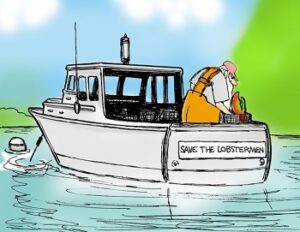
Opinion: Federal rules are sinking Maine’s lobster industry
As a lifelong Maine lobsterman, I understand the inherent dangers of my job. I keep watch on the forecast knowing that sudden weather changes can make the difference between a successful day at work and putting my crew’s life at risk. These days, however, the hazard posed by Mother Nature does not compare with the perfect storm of regulations coming out of Washington that threaten my job, our way of life and may eventually sink a fishery that has supported communities and generations of families here in Maine. By Kristan Porter >click to read< 15:18

Sanity! Federal judge blocks lobster fishing ban in the of Gulf of Maine
A federal judge in Maine on Saturday blocked a seasonal ban on traditional lobster fishing in a stretch of offshore waters in the Gulf of Maine that regulators say is needed to save the endangered right whale from extinction. In his 28-page ruling, U.S. District Judge Lance Walker said regulators had relied on “markedly thin” statistical modeling instead of hard evidence to show the thousand-square-mile area they had planned to close was really a hot spot for the imperiled whale. While the area targeted for closure may be a viable habitat for the right whale, there is no hard proof the whales actually gather there,,, >click to read< “This victory by the Maine Lobstering Union is a significant step in protecting one of Maine’s most precious industries – lobstering,” 21:10

Can American lobstermen survive new restrictions, ESA listing of the North Atlantic Right Whale?
For centuries, North Atlantic right whales were aggressively hunted for their meat and their oil, which was used to keep lamps lit and to make soap.,, Since 2017, the National Oceanic and Atmospheric Association (NOAA) has documented 34 dead whales (21 in Canada; 13 in the U.S.), and 16 whales with serious injuries from entanglements or vessel strikes. In an attempt to conserve and rebuild the population, NOAA announced new regulations in August 2021 on the Maine lobster and Jonah crab industries, including the closure of large parts of the Gulf of Maine to lobstering between October and January and requiring more traps per trawl to reduce the overall number of lines in the water. >click to read< By A.N. Smith 13:15
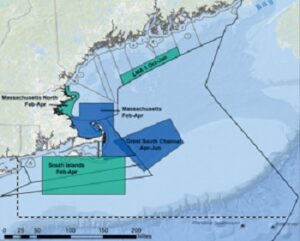
Maine Lobstering Union, lobster dealers sue over offshore closure
The union and its co-plaintiffs allege that the closure is “the product of an arbitrary and capricious agency action” and argued that the federal government’s own data showed there has not been an entanglement in Maine lobster gear for nearly 20 years. Instead, the National Marine Fisheries Service made the closure “simply to spread risk reduction responsibility across jurisdictions, without regard to the fact that lobster fishing is far more important to Maine’s economy than it is to that of any other state.” >click to read< 13:26
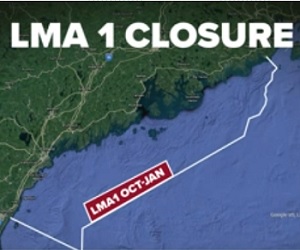
Last ditch effort? MLU gets legislative backing for court fight over Right Whale closure
In some of Maine’s biggest lobster harbors such as Stonington and Deer Isle, the closure of nearly 1,000 square miles of fishing territory is a big worry. In some of Maine’s biggest lobster harbors such as Stonington and Deer Isle, the closure of nearly 1,000 square miles of fishing territory is a big worry. Virginia Olsen fishes there and is also a leader of the Maine Lobstering Union.,, The lobstering union is going to federal court next Friday, hoping to get a temporary restraining order to stop the closure.,,, In advance of that hearing, the Maine Legislature is getting involved. >Video, click to read< 13:35
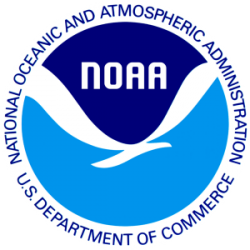
Maine Legislature threatens legal action while Maine Lobstering Union moves ahead – Files Federal Lawsuit
The Maine Legislature is threatening to fight the federal government in court over a set of controversial new seasonal restrictions on lobster harvesting in the Gulf of Maine. Last month, the National Oceanic and Atmospheric Administration released a new set of rules for New England’s lobster fishery aimed at reducing the risk to critically endangered North Atlantic right whales and other whale species. >click to read< The Maine Lobstering Union (MLU) has filed a civil action in the United States District Court for the District of Maine, seeking emergency relief related to the impending closure by agencies of the federal government of productive lobster grounds utilized by Maine’s lobster fishermen and women. >click to read< 11:04
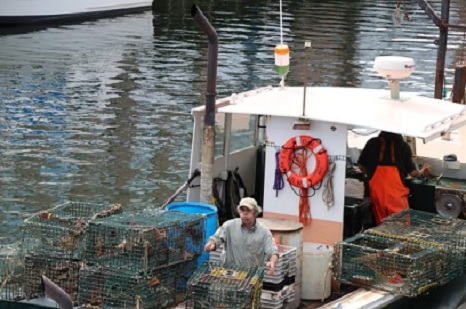
DMR briefs legislature on impact of NOAA’s new lobstering rules, options for appeal
On September 14, the Maine Legislature’s Committee on Marine Resources met and discussed the impact new rules recently released by the NOAA will have on Maine’s lobster industry, as well as the state’s legal options for appealing the rules.,, The new rules not only close nearly 1,000 square miles to lobstering between October and January, a time of year when lobster prices are at their highest, but changes the kind of gear lobstermen can use. Also discussed were threats to the right whale posed by Canada. As Keliher pointed out, the NMFS’ biological opinion noted that even if Maine is  100% successful in taking steps to protect right whales, whales will continue to go extinct if they continue to be hurt in Canada. Keliher also stated that he has had conversations with the head of> NOAA, Richard W. Spinrad, Ph.D < who hasn’t yet had a meeting with the Canadian government, but has agreed to raise the issue of including state representatives in Canadian affairs. Keliher also said NOAA’s head considers these conversations to be a government-to-government issue. He stated he disagrees and continues to press the issue. >click to read< 15:51
100% successful in taking steps to protect right whales, whales will continue to go extinct if they continue to be hurt in Canada. Keliher also stated that he has had conversations with the head of> NOAA, Richard W. Spinrad, Ph.D < who hasn’t yet had a meeting with the Canadian government, but has agreed to raise the issue of including state representatives in Canadian affairs. Keliher also said NOAA’s head considers these conversations to be a government-to-government issue. He stated he disagrees and continues to press the issue. >click to read< 15:51
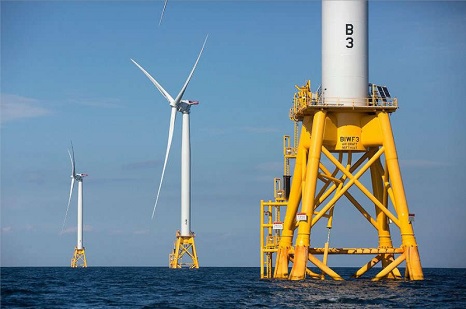
Why Offshore Wind Farms Face Lawsuits – The American Coalition for Ocean Protection
Nantucket residents have filed a landmark lawsuit over federal approval of Vineyard Wind, the first industrial scale offshore wind project in the U.S. Federal law protects existing ocean uses: commercial fishing, vessel traffic, the viewshed, and endangered species from new energy projects. Since federal approvals of all offshore wind projects will likely use the same flawed process, a court win for this lawsuit may stop all the projects. Specifically, Ackrats is the group filing the complaint and is concerned about Vineyard Wind’s negative impact on the North Atlantic right whale, “one of the most critically endangered species on the entire planet.” Those Nantucket residents are not alone. Beach communities from North Carolina to Maine and the Great Lakes joined together to form the American Coalition for Ocean Protection. >click to read< 16:13

151 Maine legislators call on Biden to rescind new lobster fishing reg’s, while the real threat remains
State legislators have submitted a letter to President Joe Biden requesting (DEMAND!) that his administration take steps to immediately rescind new regulations on lobster fishing. The new regulations, which are intended to protect the endangered North Atlantic right whale,,, Rep. Billy Bob Faulkingham, R-Winter Harbor, a lobster fisherman, initiated the letter. Maine Senate President Troy Jackson also criticized the new reg’s,, “The new 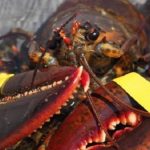 federal regulations are an affront to the men and women who have made a living on Maine’s working waterfront for generations,,, I’m deeply disappointed that NOAA has decided to dismiss the voices of Maine’s lobstering workforce and chosen to go ahead with damaging regulations that do nothing more than hurt our fishermen, while the real threat to right whales remains, Canadian ships.” Video, >click to read< 16:03
federal regulations are an affront to the men and women who have made a living on Maine’s working waterfront for generations,,, I’m deeply disappointed that NOAA has decided to dismiss the voices of Maine’s lobstering workforce and chosen to go ahead with damaging regulations that do nothing more than hurt our fishermen, while the real threat to right whales remains, Canadian ships.” Video, >click to read< 16:03

Rep. Sherm Hutchins – Maine’s lobster industry is under siege
Maine’s lobstermen and women are under attack by the Biden Administration after a recent set of rule changes restricting seasonal lobster fishing in 950 square miles of federal waters off Maine’s coast. This is an inflexible and poorly considered attempt to protect the North Atlantic right whale population. The series of rule changes are the most heavy-handed in a long line of attempts to undermine the lobster industry here in Maine. If our fisheries are not protected, and if these rules are not reversed, Maine’s fishermen and women will not recover. >click to read< 09:47
More siege from the non-productive slugs of the enviroscam movement – Zack Klyver, science director with the group Blue Planet Strategies, has a different view on the issue. I’m sympathetic to them and know that they work extremely hard,,, >click to read< 11:25
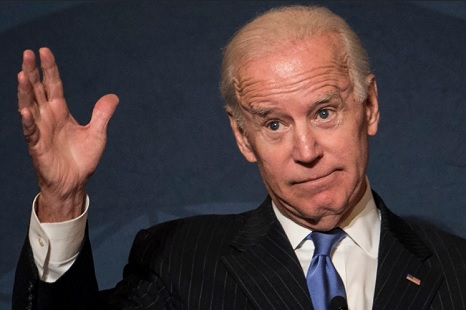
Maine lobster industry rocked by new, unworkable federal regulations
New federal regulations created to protect the endangered right whale will close off a nearly 1,000 square mile strip in the Gulf of Maine to lobstering,,, “I was contacted yesterday by someone from the media to ask me about the closure, and that was the first I heard of a closure because a closure wasn’t even on the table for us. It wasn’t even supposed to be thought of and then, all of a sudden, Joe Biden just decided he needed to close a big area of ocean. It came as a surprise to everybody. It came as a surprise to the fishermen, it came as a surprise to everybody in the state of Maine, every politician. No one saw this 950 square mile closure coming,” Rep. Billy Bob Faulkingham said. >click to read< 07:29






